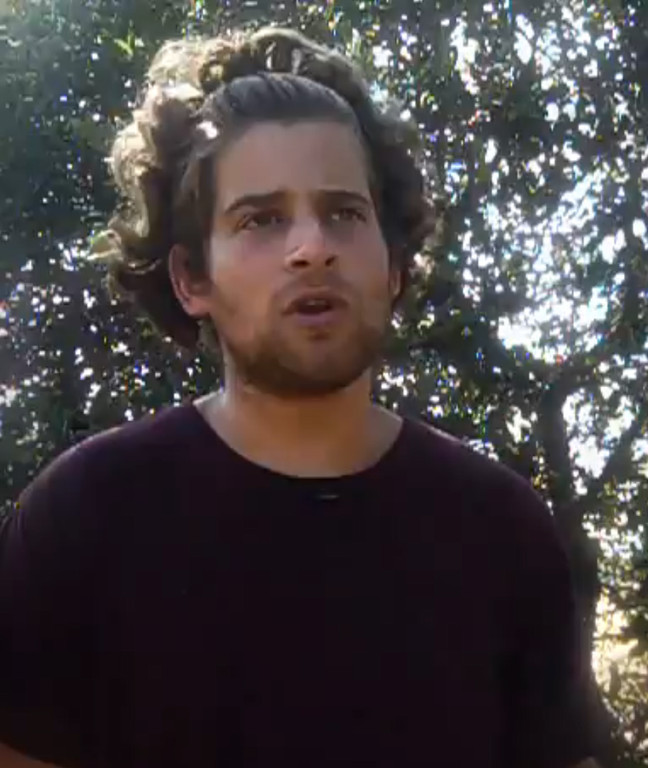Five Towner articulates “What it means to be a Jew”
The black and white pictures of Jewish personalities and scenes float, shuffle, and gather across the velvet-black background as the violin-led strains of the theme from Schindler’s List plays. Albert Einstein, Eli Weisel, a street in Europe, an Israeli flag unfurled at the Kotel and then the cursive words “What It Means to Be a Jew” appear and fade. Andrew Lustig stands defiant in the “I am Jewish” video posted on youtube, proud, among sun dappled trees and proclaims his poem and his identity.
I am a bar mitzvah…
I am constantly struggling to understand my Jewish identity outside of religion…
I am the Torah and not the Old Testament…
I am a kipa and not a skullcap…
A graduate of Lawrence High School and Lehigh University with a degree in international relations and acting, Lustig grew up in Woodmere and went to Hebrew school at Hewlett East Rockaway Jewish Center. He is currently studying at Pardes, a co-ed non-denominational and apolitical school with teachers and students from varied backgrounds and outlooks. It is located in Jerusalem.
Lustig calls his presentation “performance poetry.” Lustig’s poem was filmed, edited and set to pictures and music by Tracie Karasik while she and Lustig were on a summer program at the Brandeis Collegiate Institute this past summer. “It was the happiest month of my life,” said Lustig. “I was one of 70 Jews ages 18-26, from all over the world in a program of Torah study, art and experiencing Judaism in the outdoors on a 3000 acre campus outside of LA. I shared the poem with the people there and they worked with me to film it.” The video currently has over 190,000 hits on youtube.
“I wrote the poem when I was applying to Israel programs,” explained Lustig. “They were asking questions, who are you, why are you Jewish. I was trying to write an honest essay; it’s hard to describe outside of the obvious that I have two Jewish parents.” He notes that viewers criticized his poem, that he didn’t mention G-d, prayer or halacha, but, he noted, “I wasn’t at the point where that had meaning to me. That was what I wanted to learn. I wrote what Judaism meant to me at that point in my life.”
He realized in college that if he wanted to live a Jewish life it was “on me.” He noted that he has a religious background but, “I wanted to do something more formal and in depth, not just cultural but textual.” In college he was involved in Hillel and Chabad and Jewish Social Justice. “I love Judaism,” he emphasized. “I want to make Judaism and Israel as good as they can be. I believe in my heart that Judaism is beautiful but I didn’t have a textual basis so I came to Israel.”
On the plane he met a woman who said that he would fall in love with Israel. “It wasn’t like that for me,” he recalled. “It’s more interesting and fun than life in America but it’s life; it takes work to understand the place and fall in love with it.”
Lustig stressed that in his poem and video he is speaking “to Jews not for Jews. People can choose other words to make it theirs; I articulated something that they felt and didn’t say. The same poem can be written with different words. This is my way. Hopefully in ten years my poem looks different and in ten years after that. I am adding to my life what it means to be Jewish. My main goal is to find a healthy balance in being Jewish because it feels right. I want to always be questioning but not too much and continue finding meaning in Judaism and helping others find meaning. Not everyone is going to dedicate their lives to Torah study.” He said that people don’t have to do everything and don’t have to go to extremes, “just embrace and do it. I want people to know that the barrier to entry isn’t as big as they think.”
He said that although he can read and write in Hebrew, his Hebrew is not “good” and said that learning Hebrew has been the most difficult part. “It’s overwhelming,” he said. He is looking forward to the day when he can write a poem in Hebrew. He would like to go home this summer and possibly work in a Jewish summer camp. “I imagine I will spend more time here, I don’t think my work and experience here are done in just a year.”
Growing up in the Five Towns was a positive influence, Lustig said. He noted that seeing the “different styles of worship for some people could be divisive and frustrating.” He said that he considers himself lucky to have seen these differences, lucky to live in a large Jewish community that has room for various flavors of Judaism and noted that that is a sign of a thriving Jewish community. “The Five Towns is a very special place,” he said.
View the video at: http://youtu.be/GJe0uqVGZJA

 66.0°,
A Few Clouds
66.0°,
A Few Clouds 




